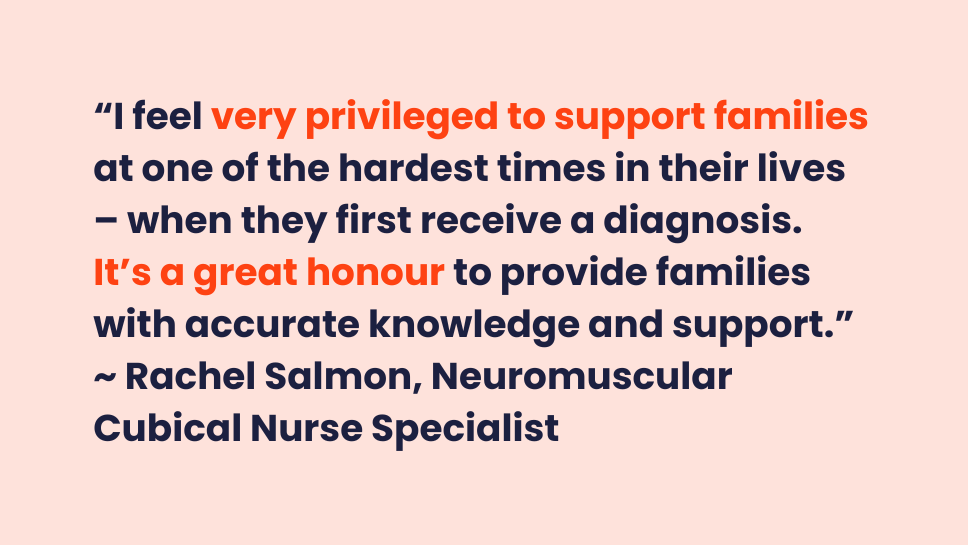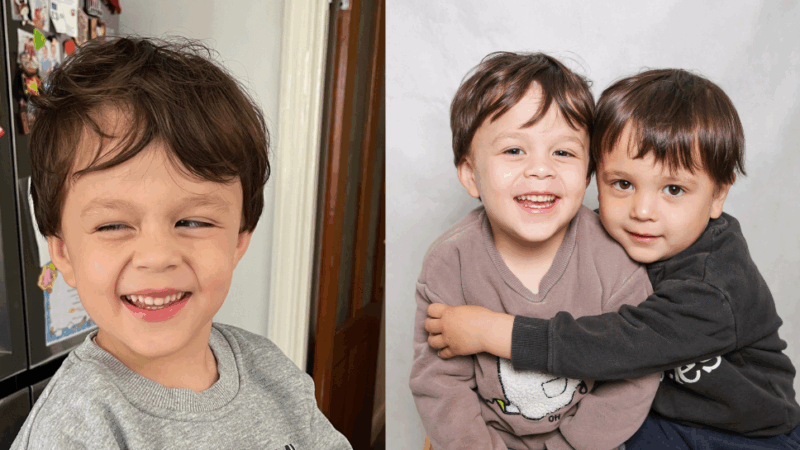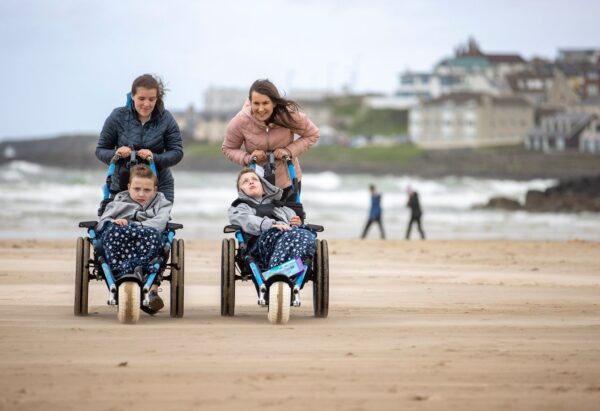To celebrate International Nurses Day, we sat down with Rachel Salmon, Neuromuscular Clinical Nurse Specialist for South East Wales, to find out about her career and the support she provides for many families in the muscle wasting community.
“It’s an honour to provide families with support” – a nurse’s career journey

To celebrate International Nurses Day, we sat down with Rachel Salmon, Neuromuscular Cubical Nurse Specialist for South East Wales, to find out about her career and the support she provides for many families in the muscle wasting community.
What is your role in the NHS and how has your career developed over the years?
As a Neuromuscular Clinical Nurse Specialist, my job is really varied. I support individuals and families with neuromuscular conditions from diagnosis all the way into adulthood. This can include running clinics or going out to visit patients in their homes, to advising on areas such as pain management and medication changes. I also organise peer support and support days for families to make sure all aspects of their care and wellbeing are looked after.
I’ve been a qualified nurse for 30 years now. I worked with patients who had cystic fibrosis in my early career and developed an interest in genetics. As it’s a competitive field to work in, I gained a postgraduate certificate in education after completing my degree in Biology and Genetics. This meant I was able to teach science in a secondary school for several years whilst working in clinics on my day off.
After a while, I found a job as Newborn Screening Care Coordinator Specialist Nurse for Wales. We were one of only three centres in the world that were screening for Duchenne muscular dystrophy via an opt in programme. If a test came back with elevated levels of creatine kinase, it indicated that a muscular condition was present. I would follow up with the patient’s primary healthcare team and consultant paediatrician to arrange further DNA bloodwork to be taken. Analysing a specific gene allowed us to find out if the patient had Duchenne of Beckers muscular dystrophy. The final step was to refer them to a consultant.
I felt very strongly that more support should be available from the point of diagnosis. For other conditions we were screening for, such as cystic fibrosis, they were referred to specialist consultants in that field.
There was no such thing at the time for Duchenne, and we only had one care advisor for the whole of Wales who was employed by Muscular Dystrophy UK. I worked with a neurologist to create more specific clinics for Duchenne, and I became the Neuromuscular Family Care Advisor for Wales.
In 2011, we were allocated funding to employ a paediatric neuromuscular physiotherapist and we now have several care advisors across the Welsh regions. More recently, I’ve been working closely with Muscular Dystrophy UK to signpost my patients to the charity’s wellbeing and counselling support, as psychology services are an area that is still lacking in Wales.
What is the most rewarding part of your job? And what do you find the most challenging thing about your line of work?
It’s hard to pick just one thing because there’s so much I love about my job. I feel very privileged to support families at one of the hardest times in their lives – when they first receive a diagnosis.
It’s a great honour to provide families with accurate knowledge and support.
But it’s also amazing to be able to look at all aspects of care, such as financial assistance and school environments, not just physical health.
One of the hardest parts is supporting patients who I’ve known for years and built a relationship with, plan advanced care directives and ensure their wishes are carried out if they chose to withdraw treatment. It has a profound impact on me and the team, but we are privileged to support our patients through every stage of their lives.
How does Muscular Dystrophy UK support your patients and the work you do?
The team at Muscular Dystrophy UK are integral to the support our patients receive. Lucia is the charity’s Advocacy and Information Officer for Wales, so we see her as part of our team. She is instrumental in helping organise support days, as well as keeping us up to date with any new available funds, for example, that would be helpful to our patients. It’s a mutually beneficial relationship as we also support Lucia with any particularly difficult helpline requests.
I’ve been working with Muscular Dystrophy UK for around 20 years now, including speaking at conferences and information days about newborn screening, and lobbying the government to provide more support in Wales. I’m very grateful to the charity for their support over the years; we’ve achieved amazing things together and will continue to do so.


